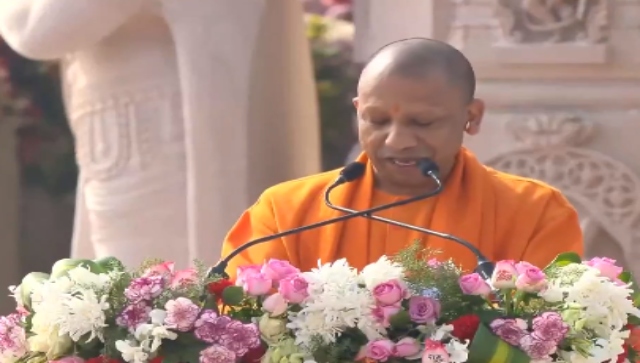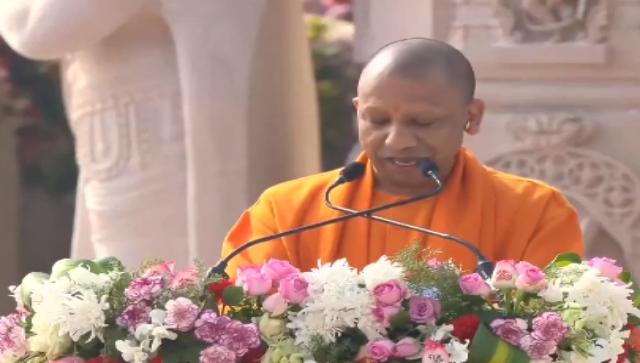Liberals are once again missing the point and mainstream media, not for the first time, asking all the wrong questions in the ongoing crackdown on illegal meat trade in Uttar Pradesh under new chief minister Yogi Adityanath.
The liberal position is unambiguous. It sees Yogi’s every action through the prism of distrust and interprets his each step as an extension of the larger Hindutva project.
From western media to eminent jurists and almost everyone in between claiming to uphold the edifice of India’s liberal-secular order, Yogi’s ascension to the UP CM’s chair is an Apocalyptic catastrophe. They are not ready to give the Mahant of Gorakhnath mutt even a small fraction of the benefit of doubt they grudgingly extended to Narendra Modi post-2014. Not that it matters.
Openness of ideas is the sine qua non of liberalism. When ideological positions become ossified, it blinkers practitioners and makes them blind to reality. At this stage, liberals resemble indoctrinated ideologues, the antithesis of everything liberalism represents. Right now in India, liberalism is undergoing such a crisis of logic that it finds merit in arguing that illegal abattoirs — that have earned the wrath of courts for slaughtering the environment — should be allowed to function so that shops may serve delectable kebabs.
The entire political discourse over the last few days has seen dire threats of Armageddon being issued from liberal towers over chicken and mutton replacing buffalo meat in ‘Tunday kebabs’. Let’s wrap our heads around the argument. Shops should be allowed to procure meat from illegal sources so that kebabs may retain their succulence, prices may be kept down and India’s liberal edifice may be maintained. That the chief minister has moved to put an end to this illegal ecosystem has been presented as the biggest proof of Yogi’s ‘persecution of Muslims’ and elaborate theories have been spun around how this denies a section of UP populace their daily intake of protein. Without a morsel of evidence.
The ridiculousness of this argument resists a rational rebuttal. If the ‘reputed’ shops had so long been procuring raw materials from illegal sources then it is time penal action is levied against these instead of lobbying for excuses or lending them a sympathetic ear. Sourcing meat from unlicensed butcher shops not only plays havoc with local economy, it also incentivises law-breakers and makes those who live by rules appear as fools. If ending of this illegal cycle forces eateries to source meat from elsewhere, so be it.
It is also misleading to think that all eateries who have been affected are in opposition to this move. One of them whose kebabs have gone off the platter told PTI that he supported the closure of illegal and mechanised slaughterhouses in the state. The owner admitted that it was “difficult for a common man to pass through a locality where the slaughterhouses were operating almost openly. He also alleged that the illegal abattoirs even indulged in slaughtering dogs.”
The more persuasive argument is of the larger ramifications of the step. Abrupt shutting down of the illegal operations renders thousands of people associated with the industry jobless and has a domino effect on the ancillary industries linked with the unlicensed abattoirs. There is no doubt that there may be a temporary spurt in unemployment as these abattoirs and butcher shops, assuming they are intent on running their businesses, apply for a licence and set up effluent treatment units.
There are two intrinsic problems with this argument. One, blaming Yogi Adityanath for acting against illegal butcher shops and meat processing units because a large number of Muslims are associated with this trade is to argue against the very grain of the Constitutionality of his position. A chief minister’s job is to ensure rule of law. He cannot be expected to indulge in acts of omission based on which section of the populace is being affected. Since assuming office, Adityanath has also banned chewing of paan and gutkha in all government premises — a trade mostly linked with Hindus. Is the chief minister anti-Hindu?
Closing of illegal abattoirs and unlicensed butcher shops was part of BJP’s poll manifesto. The chief minister, in implementing the order, is staying true to one of the promises that presumably has voter support. To argue that he should show some leeway to illegal meat traders and selectively apply rule of law is a slippery slope that might set grave precedents. It is inconceivable how the liberal argument has once again fallen on the wrong side of law and ethics.
The second issue is even more serious. Arguments in favour of keeping open illegal slaughterhouses completely ignore the enormous environmental and public health hazard linked to these units. The chief minister has clarified that in acting against these unlicensed abattoirs, he was implementing an NGT (National Green Tribunal) order passed in 2015. In May 2015, the NGT had ordered the shutting down of all slaughterhouses that do not have permission from the state pollution control board and/or other environmental clearance issuing authorities.
As a report in The Hindu points out, a Bench headed by NGT chairperson Justice Swatanter Kumar “also directed Central Ground Water Authority (CGWA) to ensure that there is no illegal extraction of water by these slaughterhouses in these three districts. Orders were also passed to constitute a committee to monitor small butcher outlets and concerned public authorities were asked to “ensure that there is a proper regulation of meat shops and appropriate measures are taken for hygiene and healthcare”
There has been no question from media — busy fulminating on illegal slaughterhouses — why the Samajwadi Party government turned a blind eye to the NGT order. Almost a year later in April 2016, the Central Pollution Control Board (CPCB) informed the National Green Tribunal (NGT) that only one out of 126 slaughterhouses in the state is operating with a valid permission and only 21 units have sewage treatment facilities. According to a report in Times of India , the information came to light when a Delhi-based petitioner moved the court against UP abattoirs “dumping blood and animal carcasses in drains, polluting ground water sources, besides illegally drawing ground water for running their equipment.”
The NGT can pass orders and repeatedly remind the administration of its Constitutional duty — which it did on more than one occasion — but when administrative duties are held hostage at the altar of “secularism”, rule of law goes for a toss. This inverted paradigm of governance has resulted in a situation where nearly the entire meat industry in the largest meat producing state of India is illegal. Only a smattering of around 40-45 are licensed and integrated abattoirs-cum-processing units. The rest, thousands and thousands of small butcher shops and hundreds of slaughterhouses spread across the western parts of the state in areas such as Meerut, Sambhal, Aligarh, Ghaziabad and Bulandshahr operate in complete disregard of all environmental norms and NGT orders.
These units discharge offal and animal waste in open drains which then finds their way to groundwater and tributaries of Ganga and Yamuna. In addition, as a Times of India report points out, “furnaces used for extracting animal bone fat releases toxic and harmful gases into the atmosphere in contravention of Air (Prevention and Control of Pollution) Act 1981.” Nearly one-fourth of a two-quintal typical buffalo is body waste that is disposed of in open fields while the liquid waste goes to drains leading to cholera, hookworm, dysentery, and other diseases, says the report quoting a study on environmental and health hazards from slaughterhouses.
An industry which spreads such a debilitating amount of pollution and has such a devastating effect on civic health cannot be allowed to run uncontrolled. That it has gone on for so long speaks volumes about the state of administration in UP and the nexus that existed between illegal meat traders and politicians who no doubt saw a rent-seeking opportunity in these practices while keeping up the façade of “secularism”. The blackmailing of these meat traders who have since gone on an ‘indefinite strike’ points to the deep rot in the system.
Yogi should be applauded for initiating this much-needed cleaning up of the state’s corrupted edifice.


)




)
)
)
)
)
)
)
)